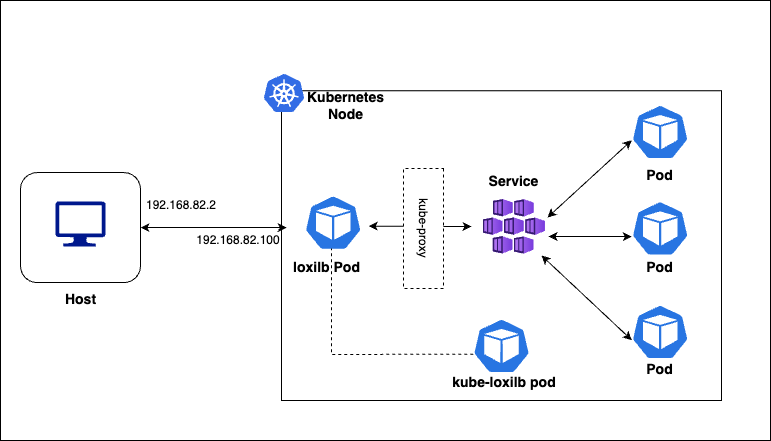K0s/loxilb in-cluster mode
Quick Start Guide with K0s and LoxiLB in-cluster mode
This document will explain how to install a K0s cluster with loxilb as a serviceLB provider running in-cluster mode.
Prerequisite(s)
- Single node with Linux
Topology
For quickly bringing up loxilb in-cluster and K0s, we will be deploying all components in a single node :

loxilb and kube-loxilb components run as pods managed by kubernetes in this scenario.
Setup k0s in a single-node
# k0s installation steps
curl -sSLf https://get.k0s.sh | sudo sh
sudo k0s install controller --single
sudo k0s start
Check k0s status
$ sudo k0s status
Version: v1.29.2+k0s.0
Process ID: 2631
Workloads: true
SingleNode: true
Kube-api probing successful: true
Kube-api probing last error:
How to deploy loxilb ?
loxilb can be deloyed by using the following command in the K3s node
sudo k0s kubectl apply -f https://raw.githubusercontent.com/loxilb-io/loxilb/main/cicd/k0s-incluster/loxilb.yml
The description of important loxilb args in the manifest file are as follows -
--bgp : Indicates that loxilb will be running with bgp instance and will be advertising the service IP to the external peer or loxilb-peer.
--egr-hooks: It is required for those cases in which workloads can be scheduled in the same nodes as loxilb nodes (most of the cases).
--blacklist=cni[0-9a-z]|veth.|flannel.|cali.|tunl.|vxlan[.]calico: It is mandatory for running in in-cluster mode. As loxilb attaches it's ebpf programs on all the interfaces but since we running it in the default namespace then all the interfaces including CNI interfaces will be exposed and loxilb will attach it's ebpf program in those interfaces which is definitely not desired. So, user needs to mention a regex for excluding all those interfaces.
--fallback: It is an optional argument and ensures that egress traffic from the cluster to the internet or external destinations defaults to system masquerade rules if no other rules apply. LoxiLB can also be used as a HA capable egress on its own.
How to deploy kube-loxilb ?
kube-loxilb is used as an operator to manage loxilb.
wget https://raw.githubusercontent.com/loxilb-io/loxilb/main/cicd/k0s-incluster/kube-loxilb.yml
args:
#- --loxiURL=http://172.17.0.2:11111
- --externalCIDR=192.168.82.100/32
- --setRoles=0.0.0.0
#- --monitor
#- --setBGP
Apply after making changes (if any) :
sudo k0s kubectl apply -f kube-loxilb.yaml
Create the service
sudo k0s kubectl apply -f https://raw.githubusercontent.com/loxilb-io/loxilb/main/cicd/k0s-incluster/tcp-svc-lb.yml
Check status of various components in k0s node
In k0s node:
## Check the pods created
$ sudo k0s kubectl get pods -A
NAMESPACE NAME READY STATUS RESTARTS AGE
kube-system kube-proxy-vczxm 1/1 Running 0 4m48s
kube-system kube-router-gjp7g 1/1 Running 0 4m48s
kube-system metrics-server-7556957bb7-25hsk 1/1 Running 0 4m50s
kube-system coredns-6cd46fb86c-xllg2 1/1 Running 0 4m50s
kube-system loxilb-lb-4fmdp 1/1 Running 0 3m43s
kube-system kube-loxilb-6f44cdcdf5-ffdcv 1/1 Running 0 2m22s
default tcp-onearm-test 1/1 Running 0 92s
## Check the services created
$ sudo k0s kubectl get svc
NAME TYPE CLUSTER-IP EXTERNAL-IP PORT(S) AGE
kubernetes ClusterIP 10.96.0.1 <none> 443/TCP 5m28s
tcp-lb-onearm LoadBalancer 10.96.108.109 llb-192.168.82.100 56002:32033/TCP 111s
$ sudo k0s kubectl exec -it -n kube-system loxilb-lb-4fmdp -- loxicmd get lb -o wide
| EXT IP | SEC IPS | PORT | PROTO | NAME | MARK | SEL | MODE | ENDPOINT | EPORT | WEIGHT | STATE | COUNTERS |
|----------------|---------|-------|-------|-----------------------|------|-----|--------|-----------|-------|--------|--------|----------|
| 192.168.82.100 | | 56002 | tcp | default_tcp-lb-onearm | 0 | rr | onearm | 10.0.2.15 | 32033 | 1 | active | 25:1842 |
Connect from host/client
$ curl http://192.168.82.100:56002
<!DOCTYPE html>
<html>
<head>
<title>Welcome to nginx!</title>
<style>
html { color-scheme: light dark; }
body { width: 35em; margin: 0 auto;
font-family: Tahoma, Verdana, Arial, sans-serif; }
</style>
</head>
<body>
<h1>Welcome to nginx!</h1>
<p>If you see this page, the nginx web server is successfully installed and
working. Further configuration is required.</p>
<p>For online documentation and support please refer to
<a href="http://nginx.org/">nginx.org</a>.<br/>
Commercial support is available at
<a href="http://nginx.com/">nginx.com</a>.</p>
<p><em>Thank you for using nginx.</em></p>
</body>
</html>
All of the above steps are also available as part of loxilb CICD workflow. Follow the steps below to replicate the above (please note that you will need vagrant tool installed to run:
$ git clone https://github.com/loxilb-io/loxilb.git
$ cd cicd/k0s-incluster/
# To setup the single node k0s setup with kube-router networking and loxilb as external load balancer
$ ./config.sh
# To validate the results
$ ./validation.sh
# To login to the node and check the installation
$ vagrant ssh k0s-node1
# Cleanup
$ ./rmconfig.sh